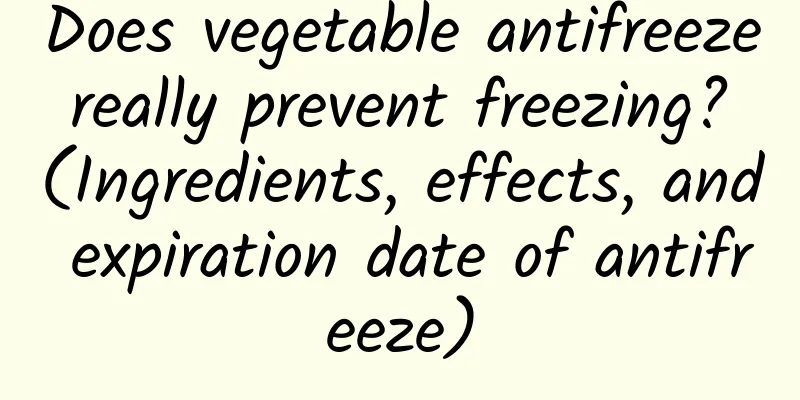Does vegetable antifreeze really prevent freezing? (Ingredients, effects, and expiration date of antifreeze)

Can vegetable antifreeze prevent freezing?Vegetable antifreeze can prevent freezing. Its main function is to activate biological enzymes, kill or prevent the generation and reproduction of ice nucleus bacteria, and maintain the stability of the biofilm structure when the temperature drops . It can also reduce and mitigate the damage to the membrane caused by low temperature and lower the freezing point of plant cells. This can enhance the water retention and antifreeze ability of plants, inhibit and destroy frozen proteins, and increase heat. This reduces the freezing ability and improves the resistance of plants to low temperatures . How effective is vegetable antifreeze?In fact, crop antifreeze is a type of cold-resistant and frost-resistant crop foliar fertilizer containing plant hormones and trace elements , which can quickly restore normal growth of frostbitten crops. Crop antifreeze can significantly improve the disease resistance, low temperature resistance and late spring cold resistance of green plants, vegetables, bananas, citrus, longan, lychee, tea, rice, various fruit trees, seedlings and other crops. Crop antifreeze can effectively prevent the damage of early frost and late frost, and reduce the damage of crops by freezing. It can quickly restore the vigor of frozen crops and restore the normal growth of crops. What are the ingredients of vegetable antifreeze?①Seaweed extract It has strong antifreeze ability and is rich in active organic matter, sugars, etc. It can improve photosynthesis, enhance nutritional level and improve antifreeze ability. ②Plant growth regulators Regulate endogenous hormones and activate the activity of enzymes in plants, thus inducing plants to produce anti-low temperature factors and enhance their cold resistance. ③Polysaccharides, alcohols, and polypeptides A polysaccharide polypeptide protein protective film is formed to protect and moisten the surface of the plant. This can prevent ice crystals from destroying the plant biofilm and avoid damage to plant cells. ④Amino acids, fish protein Rich in protein, it can increase the content of unsaturated fatty acids in membrane lipids. It stabilizes the membrane structure, improves photosynthesis, etc., thereby improving cold resistance. ⑤ Humic acid and fulvic acid Contains macromolecular organic matter, improves the activity of multiple enzymes and chlorophyll content in plants. It protects the permeability of plant cell membranes and enhances the ability of crops to resist cold and frost. ⑥ Potassium dihydrogen phosphate plasma fertilizer It can quickly replenish nutrients, maintain the nutrient balance of plants, increase the degree of plant lignification, and enhance the tree's resistance to cold. Precautions for using vegetable antifreeze 1. Usage time The best time to apply plant antifreeze is in late autumn, early winter, and spring when the temperature is 10-15℃. Spray once every 7 days and use it 2-3 times in a row. Use it 3-5 days before the cold front arrives. Dilute 150-200 times for spraying and 300-400 times for root irrigation. 2. Do not use below 5℃ Because after spraying at around 5℃, the liquid will easily freeze before the antifreeze is completely absorbed, forming a layer of ice film on the surface of the plant. This will not only hinder the plant's absorption, but also aggravate the plant's frost damage. 3. Cooperate with other antifreeze measures After using plant antifreeze, other antifreeze measures are also needed, such as soil cultivation, freezing water irrigation, whitewashing tree trunks, covering and insulation, etc., to fully enhance the plant's cold resistance. 4. Pay attention to the validity period The shelf life of antifreeze is two years, and the long-acting antifreeze has a longer shelf life, which can reach three to five years. Be sure to pay attention to the expiration date. |
Recommend
How to propagate the dragon beard tree? Cutting, layering, and sowing propagation methods
How to propagate the dragon beard tree The common...
How to grow Flammulina velutipes at home
1. Prepare the strain The conditions for growing ...
When is the best month to plant shallots
When to plant shallots Shallots are usually plant...
Is agave poisonous? Can it be grown at home?
Is agave poisonous? Agave is a poisonous plant in...
Is it poisonous to place evergreen indoors?
1. Is it poisonous? The sap in the leaves and ste...
How long is the growth period of four-leaf ginseng?
Introduction to the growth of four-season ginseng...
How to prune lucky bamboo
1. Trimming leaves If the tips of lucky bamboo le...
Key points for raising golden echinops
Soil selection for golden echinops The soil must ...
Plant a pot of chili peppers on the balcony and pick and eat them at the same time, without having to buy any!
How to grow peppers on the balcony? 1. Cut the fr...
How to grow geranium
1. Soil To grow scented geraniums, you need to pr...
How to propagate orchids by cuttings
1. How to take cuttings When taking orchid cuttin...
Can Clivia seeds be planted?
Can the seeds of Clivia be planted? The seeds of ...
How to prune plumeria
1. Pruning and height control Frangipani grows ve...
Can osmanthus be grown indoors? Is it poisonous?
1. You can grow osmanthus indoors 1. Non-toxic: I...
Is it good to water flowers with vinegar? What are the benefits of adding vinegar to water flowers?
Vinegar and water for watering flowers It is very...









